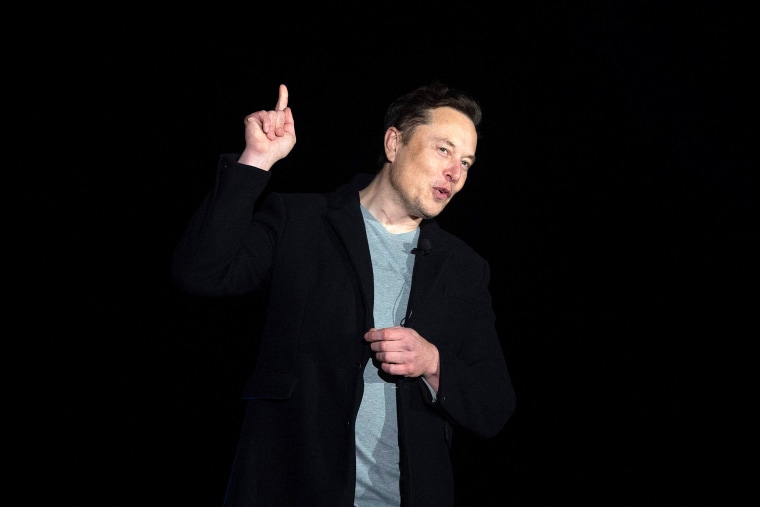Angela Dirksen had spent several weeks mulling over the decision to deactivate her account on Twitter, which she referred to as a "trolling, negative toxic space."
Then, news broke that Tesla CEO Elon Musk would buy the social media company.
For Dirksen, it was the final nail in the coffin.
"In Elon's mind, I think he believes he has this great idea that suddenly Twitter's going to become this platform for free speech," Dirksen, 46, said, referring to Musk's free speech absolutist statements about platform moderation. "It’s just going to go further down the tubes and become this cesspool of lies, misinformation, and trolling negativity. It was already heading in that direction."
It's just going to go further down the tubes and become this cesspool of lies, misinformation and trolling negativity.
Former twitter user Angela Dirksen
Dirksen is just one of many people who fled Twitter this week after its board of directors unanimously agreed to Musk's offer to purchase the app for $44 billion and take the company private.
Musk has been a polarizing figure both on and off the platform. While many on the right lauded his purchase, suggesting he could bring back figures like former President Donald Trump, many on the left said they feared Twitter could descend further into chaos under Musk.
“Free speech is the bedrock of a functioning democracy, and Twitter is the digital town square where matters vital to the future of humanity are debated,” Musk said in a statement posted to Twitter. He has repeatedly emphasized that he believes speech on Twitter shouldn't be moderated beyond the parameters set by local laws.
Musk's vocal expressions of his beliefs have seemingly set off a population migration across social media platforms, boosting downloads of Twitter alternatives.
Some people who spoke to NBC News about deactivating their Twitter accounts said they had concerns about privacy, what "free speech" meant to Musk and how he could enable hate speech and harassment on the platform.
Robert Van Rens, 47, said he was worried about Musk having access to private information from millions of Twitter accounts.
Social media networks like Facebook and Twitter can, and will, "treat customers in a much more commodified fashion," Van Rens said.
"User information is likely going to be collected, packaged and sold to anyone who is willing to buy it," he continued. "And I would rather not like to participate in it."
TikTok user and activist Zerlina, 27, who goes by @zerlinaschmerlina on the platform, echoed similar sentiments, saying she was concerned about how speech could change on the platform under Musk's ownership.
Zerlina asked that NBC News only refer to her by her first name due to concerns of harassment for speaking out about her opinions, which she said she's already experienced.
On Tuesday, Zerlina began organizing a Twitter boycott, asking others on social media to deactivate their accounts — at least temporarily. The boycott would last from May 1 to May 10.
"I’ve been called a 'woke liberal' who doesn’t want to secure the freedom of speech," she said. "I’ve had people express their excitement at the possibility of Trump’s return. I honestly think it’s sad how many people put billionaires like Elon Musk on a pedestal."
Zerlina acknowledged that some creators rely on Twitter as part of their income and brand and thus will not be able to permanently leave the site. She said a boycott allows them to make a point without erasing their platform permanently.
She said she hopes the boycott will show the “injustice in a billionaire prioritizing the purchase of a social media platform, rather than prioritizing healing communities.”
“My hope with the boycott is for people to see what we can accomplish when we move together,” Zerlina said. “I want us to learn that there truly is power in our collective unity on certain issues.”
A number of people have already deactivated their accounts or told Zerlina they plan to in response to the boycott, she said. But deactivations independent of the boycott, like Van Rens' and Dirksen's, have already begun.
In the wake of the deal's announcement, some major accounts saw fluctuations in follower size. Some politically conservative accounts, like that of Rep. Marjorie Taylor Greene, R-Ga., gained followers, while some accounts on the left, like that of former President Barack Obama, saw their follower counts dip.
“While we continue to take action on accounts that violate our spam policy which can affect follower counts, these fluctuations appear to largely be a result of an increase in new account creation and deactivation,” Twitter said in a statement to NBC News this week.
In response to her calls for a boycott, Zerlina said many people told her they do not intend to come back after they deactivate their accounts.
"While we may not have a huge monetary impact on Elon due to the intended privatizing of Twitter, it’s important for us to collectively disengage with issues or circumstances that will not serve or invest in the working class," said Zerlina, who will also permanently deactivate her account.
For the time being, both Van Rens and Dirksen said they do not intend to return to Twitter, either.
"I don't see a positive outlook at all on this," Dirksen said. "I just think it's going to turn into a bigger cesspool."


